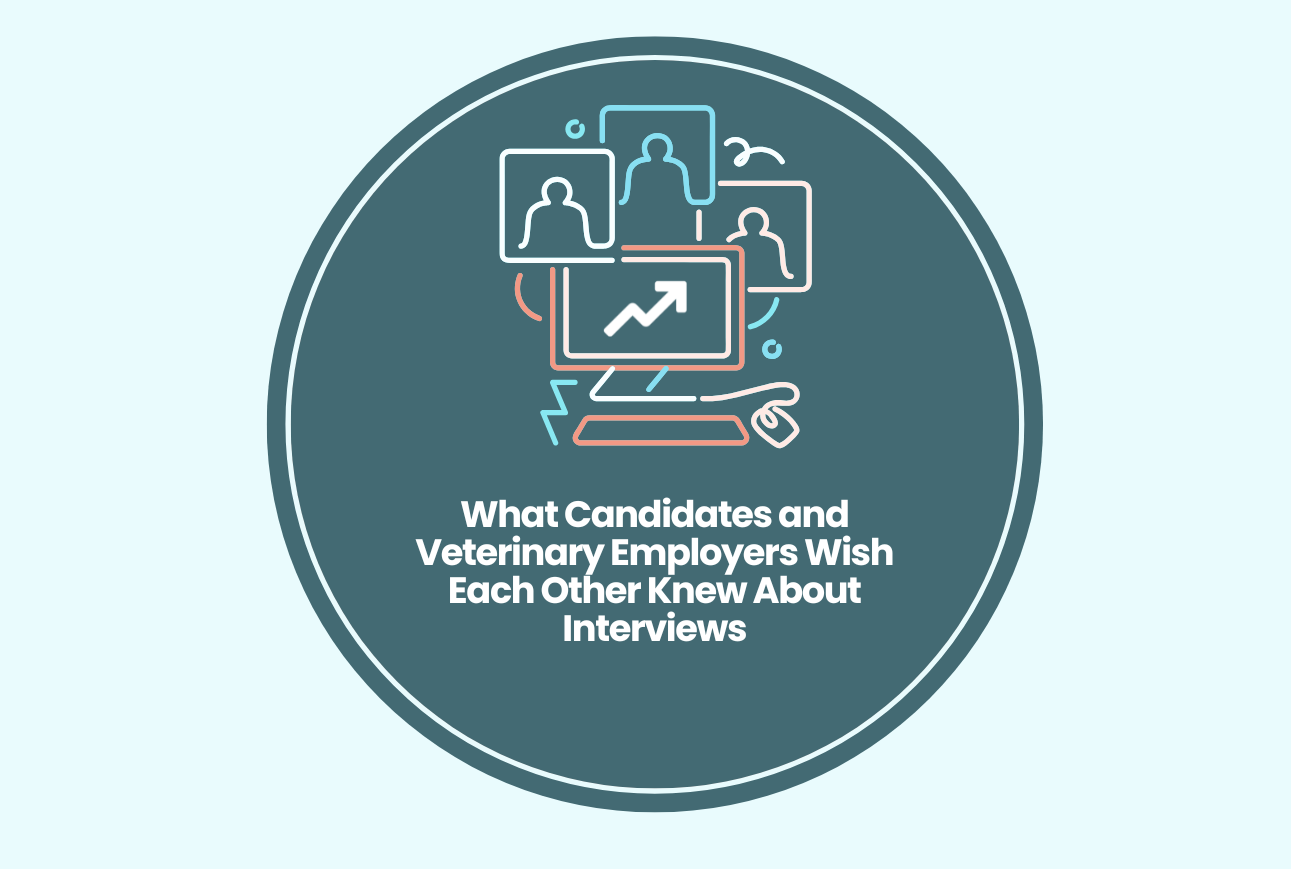
There’s always a lot of talk about respect when it comes to interviewing for a veterinary job. Candidates are told to be early, dress appropriately, do their homework, and put their best foot forward because, as the saying goes, “First impressions mean everything.”
And it’s true! How you present yourself in an interview does matter. But in the world of veterinary recruiting, interviews often feel one-sided. To truly succeed in the veterinary hiring process, both employers at veterinary clinics and job seekers need to understand what the other side is experiencing.
Veterinary Hiring Isn't Just About Evaluating Candidates

My name is Austin Rhodes, and I’m the veterinary recruiting manager for Vetcelerator. As someone who’s been in recruiting for nearly five years, I’ve conducted more interviews than I can count. If I’ve learned anything in that time, it’s this: the best interviews happen when the candidate feels comfortable. Not grilled. Not judged. Just respected and supported enough to show up as their authentic self.
Candidates are often nervous. They’re juggling schedules, emotions, and maybe even a job they’re trying to leave quietly. They’re taking a risk, putting themselves out there, and it’s our job as veterinary interviewers to create a space that encourages openness.
We get the best insight into someone’s personality and potential not by testing them under pressure but by showing them respect and allowing them to relax enough to be honest.
An Interview Story That Stuck With Me as a Recruiter
Recently, I heard about an interview that didn’t go so well, and not because of the candidate’s qualifications.
The employer had a virtual interview scheduled for 12:00 PM. They logged on at exactly noon, waited two minutes, and when the candidate wasn’t there, they logged off. Three minutes later, the candidate logged in, but it was too late. The employer had already moved on, labeling the candidate as “not punctual.”
Technically, they weren’t wrong. The candidate should have arrived early. But the way the situation was handled? That’s where I disagree.
What the Job Candidate Could’ve Done Better
Let’s start with the candidate. No one is perfect, and interviews (especially virtual ones) come with their own set of challenges. But a few proactive steps can make all the difference in how a candidate presents themselves.

Log in Early (5–10 minutes):
Treat every virtual interview like it’s in-person. You wouldn’t walk into an office building right at the scheduled time and expect to be fully composed and seated within seconds. The same applies to Zoom or any other virtual platform. Logging in early gives you time to settle in, deal with any technical hiccups, and be mentally present.

Check Your Technology:
Make sure your webcam and mic are functioning and your internet connection is stable. Restart your computer earlier in the day if necessary. If you’re not familiar with the meeting platform, open it in advance and practice logging in. Nothing disrupts a first impression like fumbling with tech settings at the last minute.

Communicate Clearly and Early:
If something does come up, whether it’s a power outage, a sick child, or simply running late, send a quick message. Even a short email or phone call saying, “I’m running a few minutes behind due to ___, but I’ll be there shortly,” shows respect and professionalism. Silence creates uncertainty and erodes trust.

Set Up Your Environment:
Find a quiet space where you won’t be interrupted. Tell others in your home when your interview is happening. Turn off notifications and close unnecessary tabs or programs. This minimizes distractions for you and also demonstrates to the interviewer that you’re taking the opportunity seriously.
Veterinary interviews are often high-stakes moments, but preparation shows your dedication. Even a few extra steps can set the tone for the entire conversation and demonstrate your reliability as a potential vet clinic employee.
Where the Employer Fell Short
Now, let’s shift focus to the employer. In this scenario, they logged off after just two minutes and never looked back. That sends a pretty clear message, and the message is, “Your time doesn’t matter as much as mine.” That’s not the kind of message that attracts top talent. This employer did not handle the situation well due to:
Not Logging in Early Themselves::
Just like candidates should arrive early, interviewers should, too. It shows respect and professionalism, and it gives you time to prepare or review the candidate’s resume one last time. Plus, being early puts you in a better position to troubleshoot if something goes wrong on your end.
Showing Zero Patience:
Two minutes is hardly enough time to make any judgment call. Life happens. Interviews start late. Links break. People get kicked out of meetings. Waiting 5–10 minutes is strategic. Rushing to a decision based on a tiny delay can mean missing out on someone fantastic.
Not Asking Questions or Following Up:
The employer didn’t give the candidate a chance to explain. No email. No call. No follow-up. Just a hard “no” without context. That ends an interview and it ends any possibility of a relationship. It also communicates a lot about your company culture to that candidate, who might now share their negative experience with others.
Missed Opportunity for a Teachable Moment:
If punctuality is important to your team (and it absolutely should be), then use these moments to coach, not just cut. A quick follow-up saying, “We noticed you were late. Can you tell us what happened?” opens the door to dialogue and may reveal context that’s worth considering. Important to note, if there are recurring issues with multiple candidates across interviews, maybe it’s time to reexamine the structure or communication around the interview process itself.
Veterinary employers hold a lot of power in interviews, but with that comes responsibility. How you treat candidates for your veterinary clinic reflects your values long before an offer is ever made.
How to Approach Veterinary Recruiting
We talk a lot about culture fit in the veterinary hiring process, about finding the right person, not just the right resume. But part of finding that fit means giving people the benefit of the doubt and approaching every interview with empathy and curiosity. Dismissing a candidate for a veterinary job without giving them a chance to speak doesn’t just hurt them, it can hurt your hiring outcomes. The candidate walks away feeling disrespected, and your clinic might miss out on someone who could’ve thrived in your team.
Conclusion
Respect shouldn’t be reserved for one side of the Zoom call. Just like veterinary candidates are expected to come prepared and act professionally, veterinary employers should show up with patience, grace, and an open mind. Because when respect goes both ways, everyone wins. Candidates feel valued. Employers make better-informed decisions. And the veterinary hiring process becomes what it’s supposed to be: a conversation, not a test.
If you’re hiring for a veterinary clinic or searching for your next veterinary job, Vetcelerator has expert veterinary recruitment services. Let us help you make the hiring process smoother for both employers and candidates. Contact us today!




